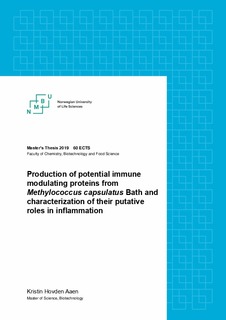| dc.contributor.advisor | Mathiesen, Geir | |
| dc.contributor.advisor | Arnoldussen, Yke Jildouw | |
| dc.contributor.advisor | Lea, Tor Erling | |
| dc.contributor.author | Aaen, Kristin Hovden | |
| dc.date.accessioned | 2019-08-16T08:50:21Z | |
| dc.date.available | 2019-08-16T08:50:21Z | |
| dc.date.issued | 2019 | |
| dc.identifier.uri | http://hdl.handle.net/11250/2608649 | |
| dc.description.abstract | Commensal microbes have for a long time been considered important for the function and development of the human immune system. Later studies also highlight the beneficial potential of non-commensals to human health. The non-commensal, gram-negative bacterium Methylococcus capsulatus Bath, mainly found in soil and water, has shown to reduce soybean meal-induced enteritis in Atlantic salmon (Salmo salar) and dextran sulfate sodium (DSS) induced colitis in mice. However, the immunomodulatory mechanism behind the anti-inflammatory effects has not been identified. This study is a part of a larger project aiming to characterize the mechanism through which M. capsulatus Bath elicit its anti-inflammatory functions. The main aim of the present study is to investigate whether proteins from M. capsulatus Bath may contribute to its immunomodulatory effects.
Four M. capsulatus Bath proteins, namely the TIR-like protein, MIF, SIMPL-like protein, and MAM, with sequence or structure homology to proteins with known immunomodulatory properties, were produced by recombination and purified. The proteins were used in vitro to explore the proteins’ putative abilities to regulate expression of the pro-inflammatory cytokine interleukin-8 (IL-8) in human intestinal cells and their effect on the nuclear factor-kappa B (NF-κB) signaling pathway. Results from the current study show that all the tested proteins from M. capsulatus Bath can influence IL-8 expression either positively or negatively, and therefore may contribute to the bacterium’s immunomodulatory effects. However, the results indicate that the NF-κB pathway not necessarily is involved. Additional experiments are required to characterize the exact mechanisms to which the proteins modulate a host immune response, both in vitro and in vivo. In conclusion, the results from this study provide important steps towards identifying the mechanism behind the anti-inflammatory effects of M. capsulatus Bath. | nb_NO |
| dc.description.abstract | Kommensale mikroorganismer har i lang tid vært vurdert som viktige for det humane immunsystemet. Nyere forskning åpner også opp for at ikke-kommensale mikroorganismer kan bidra til forbedret human helse. Den ikke-kommensale, gram-negative bakterien Methylococcus capsulatus Bath har evne til å redusere soyabønneprotein-indusert enteritt i atlanterhavslaks (Salmo salar) og dextran sulfate sodium (DSS) indusert kolitt i musemodeller. Mekanismen bak den immunmodulerende effekten av M. capsulatus Bath er hittil ikke kartlagt. Denne studien er en del av et større prosjekt med mål om å kartlegge mekanismen bak de anti-inflammatoriske effektene til M. capsulatus Bath. Hovedmålet med denne studien er å undersøke nærmere om proteiner fra M. capsulatus Bath kan stå for, eller bidra til, de immunmodulerende effektene til bakterien.
Fire proteiner fra M. capsulatus Bath, kjent som TIR-like protein, MIF, SIMPL-like protein, og MAM, med sekvens- eller strukturhomologi til proteiner med kjent evne til å modulere immunresponser i en vert, ble produsert og isolert. Proteinene ble videre testet med to tilnærminger for å evaluere deres effekt på humane immunresponser. Disse tilnærmingene undersøker proteinenes evne til å påvirke produksjon av det pro-inflammatoriske cytokinet IL-8 og aktiviteten til den viktige nuclear factor-kappa B (NF-κB) signalveien. Resultatene i denne studien viser at alle proteinene kunne modulere IL-8 produksjon, men at NF-κB signalveien ikke nødvendigvis var involvert i den prosessen. Påfølgende forsøk er nødvendige for å kartlegge mekanismene bak proteinenes effekter, både in vitro og in vivo. M. capsulatus Bath har et stort terapeutisk potensial, og resultatene fra denne studien er et viktig steg i riktig retning for å identifisere mekanismen bak M. capsulatus Baths anti-inflammatoriske effekter. | nb_NO |
| dc.language.iso | eng | nb_NO |
| dc.publisher | Norwegian University of Life Sciences, Ås | nb_NO |
| dc.rights | Attribution-NonCommercial-NoDerivatives 4.0 Internasjonal | * |
| dc.rights.uri | http://creativecommons.org/licenses/by-nc-nd/4.0/deed.no | * |
| dc.subject | Inflammatory bowel disease | nb_NO |
| dc.subject | Methylococcus capsulatus | nb_NO |
| dc.title | Production of potential immune modulating proteins from Methylococcus capsulatus Bath and characterization of their putative roles in inflammation | nb_NO |
| dc.type | Master thesis | nb_NO |
| dc.subject.nsi | VDP::Medisinske Fag: 700::Basale medisinske, odontologiske og veterinærmedisinske fag: 710::Medisinsk molekylærbiologi: 711 | nb_NO |
| dc.subject.nsi | VDP::Medisinske Fag: 700::Basale medisinske, odontologiske og veterinærmedisinske fag: 710::Medisinsk immunologi: 716 | nb_NO |
| dc.source.pagenumber | 106 | nb_NO |
| dc.description.localcode | M-BIOTEK | nb_NO |

